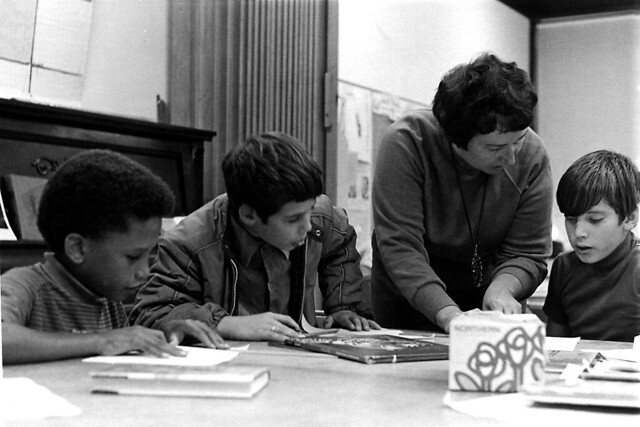
© 1970 Pip R. Lagenta, Flickr | CC-BY-ND | via Wylio
Each week, I publish a post containing three or four particularly useful resources on classroom instruction, and you can see them all here.
You might also be interested in The Best Articles (And Blog Posts) Offering Practical Advice & Resources To Teachers In 2015 – So Far.
Here are this week’s picks:
Jim Bentley, who’s definitely worth following on Twitter, shared this gem from the University of Oklahoma – it’s an interactive of instructional strategies. If I wasn’t feeling lazy tonight, I’d make this resource a post of its own! It looks that good!
A Reading Reconsidered Excerpt: Layered Reading is from Doug Lemov. I’m adding it to The Best Resources On “Close Reading” — Help Me Find More.
Here’s a guest post that appeared in Doug Lemov’s blog on peer tutoring. I’m adding it to The Best Posts On Helping Students Teach Their Classmates — Help Me Find More.
Alicia Johal has developed a useful list of questions teachers should consider before using any tech tool in their classroom. I’m adding it to The Best Advice On Using Education Technology.
The resources in this next tweet could provide very useful models when doing a similar classroom lesson:
We're thrilled to show you the work of the student winners of our editorial cartoon contest: https://t.co/e9k2K4xbIo pic.twitter.com/OADUGAbt3M
— NYT Learning Network (@NYTimesLearning) November 19, 2015
I’m adding this next tweet to The Best Resources For Applying “Fed Ex Days” (Also Known As “Genius Hours”) To Schools:
Learn more abt #geniushour & Genius Hour Guidebook by @gallit_z @mrsdkrebs at book website! https://t.co/3l7Ywdfhlg pic.twitter.com/lOca01rt5w
— MiddleWeb (@middleweb) November 16, 2015



Wow, thanks for this. Love the strategies (I’ve used them all) listed in one place by J. Bentley. I also use one called “My Best Mistake” – students reflect on their own work and share where their thinking broke down, even ask, collaborate together. Sets culture that says learning is messy, expect to make mistakes, and here is a safe place to unearth our learning. (AKA Growth Mindset, really)
I would also like to add, to the idea that technology is a tool, that we still need content/curriculum. I think we are doing a better job with educational software; though I would argue that most of the software labeled as “educational” is really pretty bad (same could be said for some of our text books!). I would love to see the trend moving towards adaptive/mastery based technology. Not as a stand-alone substitute, but ONE more tool (we will always need the social piece of learning for deep understanding, I believe.) Adaptive software allows real personalized learning based on a student’s own unique learning progression.
But…like all teachers, I have little time, or even desire, to plow through the hundreds of thousands of apps, let alone their reviews; and I’ve mostly been disappointed by reviews that rely on recommendations based on opinions. I like a more scientific approach. I have made it my practice to go FIRST to http://www.balefirelabs.com to check out their reviews because they rate apps based on components necessary for learning (feedback, mastery based, adaptive, etc.). The ratings allow me to see if an app I am considering might need a little additional support on my end. They also have some REALLY great blog posts!
Glad I found YOUR blog!